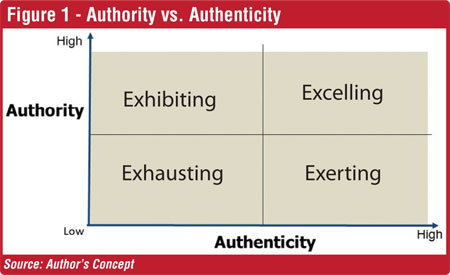Saturday Feb 14, 2026
Saturday Feb 14, 2026
Monday, 28 March 2022 02:15 - - {{hitsCtrl.values.hits}}

 Overview
Overview
“A Leader is a dealer in Hope,” so said Napoleon Bonaparte. Despite the doom and gloom that we see all around, we still have hope for a resilient recovery. Being a country of beauty and brains, blunt politicians should not be allowed to ruin it any further. I have never been a political animal in being for or against people at the helm. My attempt here is to highlight the high relevance of authentic leadership in serving the country better. In fact, authentic leaders are in acute demand to ensure wise decisions, right actions with proper listening to experts.
Authority and authenticity
As we are aware, leadership is all about inspiring, influencing and initiating. It is more than positions and titles as it involves decisions and actions. Authentic leaders had always been there in the world. All great religious leaders are obviously authentic. From Jathaka stories to the Bible, many such examples could be found. Yet, as in most of the cases, the real packaging was done in the West.
Authority is simply the legitimate power. How is it connected to authenticity with regard to leaders? How can authority and authenticity meaningfully be related? We can see four possible options. Figure 1 illustrates it in detail.
Based on Figure 1, we can describe the four possible scenarios as follows:
Exhausting
A clear struggle with both aspects being low is meant here. It directly points to a poor attitude and aptitude. Sad to see some prominent political figures through their utterances reveal their lack of authenticity in “wasting the authority vested.”
This is the cluster of people who are very loud in criticising the slightest when in the opposition, and whilst in power, very lame in blaming others for their inability to perform the assigned tasks, or to achieve the given targets. It is always a case of passing the buck with lamenting instead of leading. We saw many such nonsensical utterances criticising the local approach towards tackling COVID-19. Now the same is about the current socio-economic challenges.
Exhibiting
This is the common tribe we see in the political circles. Showing the society, a virtuous outlook while being vicious in misusing the vested authority. No political party can absolve itself from this. Gross abuse of power we heard in multiple instances can be summed up in this category. Again, the authority vested is wasted.
The social media is full of revelations of such virtues and vices involving many popular figures who blatantly say they did not say something, where the original video footage is still available. Insomnia in forgetting the past, or selectively recalling only the favourable past are signs of such behaviours.
Exerting
Another interesting category of “people representatives” who attempt to do a genuine job but lacking the required authority. The bountiful backbenchers who occasionally complain about missing the needed authority. One positive aspect is the decency some of them demonstrate in having patience despite being overlooked for deserving positions.
This category is perhaps the hardworking servants who are not being invited for celebrations. Tapping their energy and enthusiasm can pave way for better results. They do not have vested authority to waste. We see many such unsung heroes in the society who go unappreciated. Humanitarian assistance from silent Samaritans during the COVID-19 locked down period is a case in point.
Excelling
This is the ideal place to be where you have the much-needed authority whilst showing the expected genuineness to the fullest. King Devanampiyatissa demonstrated this in his meaningful dialog with Arahat Mahinda. We had this rare breed in the political circles in the past. We see the religious leaders in the calibre of Malcolm Cardinal Ranjith aptly demonstrating the appropriate blend of authority and authenticity in his words and deeds in the aftermath of the Easter Sunday tragedy. Many committed professionals, civil and military alike demonstrate this rare calibre in the ongoing COVID-19 battle.
It reminds me what was shared with me by my friend Mano about William Gopallawa, the first Buddhist Governor-General and first non-executive President of Ceylon/Sri Lanka, relating to an incident where he was insulted by a golf caddy in Nuwara Eliya. “The grace of power, is not using it but knowing when not to use it.” That is the sure way to ensure that the authority vested is not wasted.
 Triple spheres of authentic leaders
Triple spheres of authentic leaders
For me, the key is authenticity. It comes from being ethical and effective. What could be an appropriate way to connect authentic leadership with what we need to do? I propose triple spheres for leaders to depict their authenticity, namely servant, synergist, and strategist.
Authentic leader as a servant
We have often discussed the need for a leader to be a servant. It goes with the maxim that those who serve deserve leadership. It was Robert Greenleaf Robert who “branded” the concept of servant leadership. “The servant-leader is servant first. Becoming a servant-leader begins with the natural feeling that one wants to serve, to serve first. Then conscious choice brings one to aspire to lead.” That is how Greanleaf described the servant leadership. This fits to the Ethos dimension of Aristotle. It means good character, proper sense, and right will. Authentic leaders should be willing to serve in a genuine manner. We find many such examples from multiple fronts. From the religious front, Mother Theresa devotedly demonstrated the dedication towards deserted children. From the business front, Jan Carlzon of Scandinavian Airlines (SAS) is a fitting example where he upheld service at all levels. “We have 50,000 moments of truth every day,” said he at the beginning of the successful SAS turnaround, referring to every time an employee of the company came into contact with a customer.
Authentic leader as a synergist
Leader needs a team in order to move towards a shared dream. It is not being autocratic but democratic, not being coercive but collaborative. World of sports have many such examples where leader harnesses a winning team.
Authentic leaders have to awaken the team spirit in fostering synergy. Leveraging on strengths of each team member, the leader can collectively do more. What Mahatma Gandhi demonstrated in rallying a nation with non-violence against a forceful empire is this reality. He was a true synergist and the community, even while he was in jail practiced what he preached.
In the business world, we meet Steve Jobs of apple fame who spoke a lot on passion. He ignited the spirit of innovation among his team members in being a strategist. So was Narayana Murthy when he created Infosys in India where every member was proudly called as an Infosyan.
This fits the Pathos dimension of Aristotle. It represents being emotionally involved and showing kindness to the followers.
Authentic leader as a strategist
This is where the head comes before heart and hand. Crafting and executing “the game plan” of the organisation is what an authentic leader should do. It reminds me of a brilliant book I read so many years ago, titled, “Mind of the Strategist.” Kenichi Omae vividly depicts the triangle consisting of company, customer, and competitor. Siting many Japanese business successes, he highlights the need to be sharp and specific. “Rowing harder does not help if the boat is headed in the wrong direction,” said he.
This fits the Logos dimension of Aristotle. It represents deep thinking, logical reasoning, and rationally arguing. Its connection to strategy making is very clear.
Relevance to Sri Lankans
Having observed the nature and features of authentic leaders, let us see the relevance to us. Are Sri Lankan managers in the private sector and the administrators in the public sector think and act like authentic leaders? I leave it for the intelligent readers to decide. One thing is quite clear. We all can improve on this front. How to be an authentic leader? I would propose five Ps to ponder.
Purposeful
Do we know the purpose of our organisations? It can be Vision, Mission, or Aspiration. Clarity leads to commitment. Are we clear about the way forward in terms of living our purpose? Authentic leaders should do so.
Passionate
Do we demonstrate passion in our actions? Are we ready to commit ourselves to fulfil our purpose? It is appropriate to do a soul-searching to see whether we are passionately attending to our tasks or passively doing so.
Principled
Are we clear about our corporate values? Do we really demonstrate them in our actions? Are we willing to forgo monetary gains if it is conflicting with our principles? Are we really ready to sacrifice being “popular” for being “purposeful”? Then only authenticity is possible.
Pragmatic
Are we practical in our suggestions and recommendations? Do we clearly see the ground reality or still see the clutter above? Are we willing to be participatory in decision-making? Do we invite ideas from our team members? This is how authentic leaders act.
Persuasive
Do we sufficiently influence our teams towards targets? Are we really convincing others the need to achieve challenging objectives? Do we invite our teams to believe in themselves in reaching difficult goals? Such a path is required to be an authentic leader.
Having looked at the scenario in general, it is pertinent to comment on the opportunities in front of state leaders in performing as promised. That is where you need a structured approach in crafting and executing strategies.
Grappling with ground realities
There needs to be a comprehensive performance management system, particularly in the public sector. It is sad to observe that despite many attempts during many times, it is still at a primitive state where meritocracy is still not given the due prominence. There was a conscious attempt to popularise the concept of Management for Development Results (MfDR) tested and proven in many public circles around the globe. It involves both short-term and long-term focus with moving from activities to outputs and outcomes.
MfDR focuses on development performance and on sustainable improvements at country level. It also includes practical tools for strategic planning, risk management, progress monitoring, and outcome evaluation. In essence the perspective of impact or result is the central focus. In simple terms, for a desired result to be generated there should be an outcome. For the desired outcome there should be outputs. For desired outputs to appear there should be a series of activities that need to be done.
Way forward
The best way to take the discussion on authentic leaders forward is to be one of them. Authentic leaders are in high demand, locally and globally. Instead of being unethical, unfair, and untruthful, what is acutely required is the authenticity. Operating in triple spheres as a servant, synergist and a strategist is what one should do. Perhaps a fresh opportunity may emerge as a silver lining in the dark cloud, where people should consciously shift from “searching for heroes” to “serving for humanity.” In the broad context, we need a robust sustained system within a consistent policy framework that should be respected by all political parties.
(The writer is the immediate past Director of Postgraduate Institute of Management, and can be reached through [email protected], [email protected] or www.ajanthadharmasiri.info.)